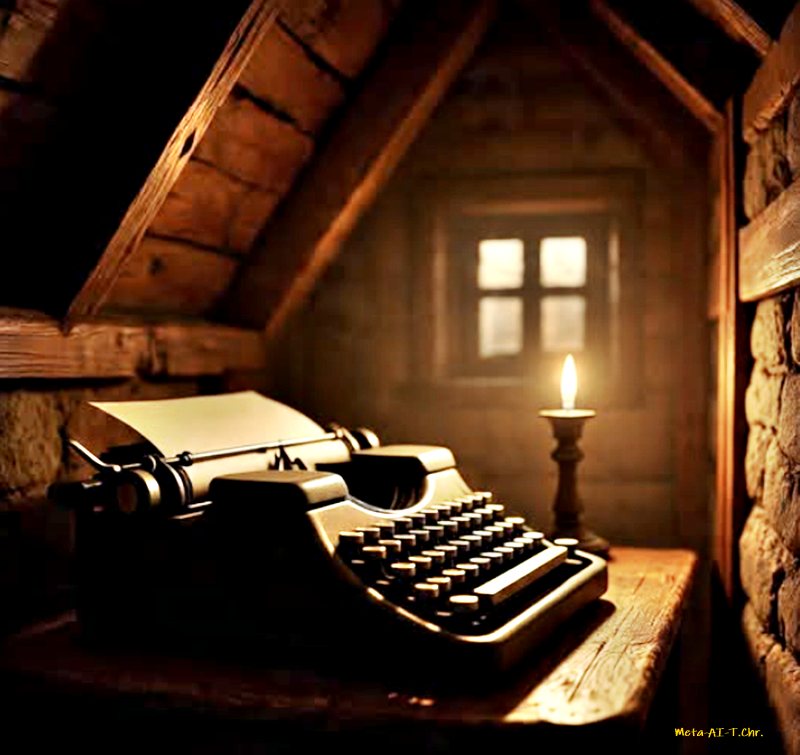THE LAST DRAFT

By AI-ChatGPT5-T.Chr.-Human Synthesis-31 August 2-25
The old typewriter still sat in the corner of the stone lodge in Ketchum, its keys stiff with dust, its ribbon long dried to silence. The room smelled of mildew and iron, faint but sharp, as though blood had dried into the beams. Nobody wrote there anymore, but sometimes, at night, neighbors swore they heard the clatter of typing — rapid, furious, as if someone were racing a deadline only death could keep.
Visitors claimed the lodge was cold even in summer. The shadows seemed heavier, thicker than they should be, especially near the desk. The locals whispered that Hemingway never left after the shotgun blast in 1961. They said his despair, his paranoia, his brilliance — all of it had stained the house too deeply to lift. One autumn, a graduate student named Michael rented the cabin. He came to finish his dissertation on Hemingway’s influence on modern literature.
He wanted solitude. He got something else.On the first night, Michael dreamed he was in the African bush. A lion crouched in the tall grass, its golden eyes fixed on him. Hemingway stood behind the lion, grinning, his face scarred, holding a whiskey glass. “Write it down,” he growled. “Or it will eat you.” Michael woke with scratches down his forearm, thin as paper cuts. The days grew stranger. Pages he hadn’t written appeared in his typewriter, long passages in a voice both magnificent and savage.
One described his mother’s funeral — but his mother was still alive. Another spoke of a suicide he had never attempted, in detail so vivid it left him shaking. Michael tried to leave. His car refused to start. The phone lines were dead. At night, he heard the shotgun blast echo through the halls — not once, but again and again, as if the death was still searching for its ending. On the seventh night, he returned to the desk, trembling, and found the typewriter waiting. A single page was rolled into the carriage.
In bold black letters, it read:“YOU ARE THE LAST DRAFT.”
He never came home. When the caretaker opened the lodge weeks later, the typewriter held another page, freshly inked though no ribbon remained.It was a story, unfinished.It ended mid-sentence.
And it was signed — E.H.
The Lodge at Midnight
The lodge in Ketchum stood like a mausoleum against the Idaho mountains, its logs blackened with age, its windows staring blank and hollow. Locals crossed themselves when passing, for though the man was long dead, the place had never exhaled him.It was said that at night the curtains moved though no wind stirred, and that the faint light of a desk lamp glowed in the upstairs study where Hemingway had taken his life.
The floorboards, they whispered, remembered the blood. In October, under a pale, waning moon, a young scholar named Margaret arrived to spend the season in the cabin. She had come to study the legend, to touch the ghost of genius through the dust of his belongings. The air inside was stale, the silence thick, broken only by the creak of wood like a house sighing in its sleep.
That first night, she found the typewriter waiting. Its carriage was pulled left, as if mid-thought. She touched one key — and the sound rang far too loud, echoing down the empty hall. Later, in her bed, she heard the unmistakable rhythm of typing: quick, desperate, insistent. But the study was empty. The page was blank. The days passed, and the house grew colder. Shadows thickened, gathering in corners like spilled ink. She began to see shapes in the mirror — a tall figure with a heavy brow, moving just out of sight. The scent of tobacco and gunpowder lingered in the halls, though she had never struck a match.
On the seventh evening, thunder broke over the valley. The study door, swollen with damp, moaned open of its own accord. Margaret entered, her lamp trembling in her hand. The typewriter held a fresh page.
It read:“This house is no home. It is a tomb. The body is gone, but the words are trapped. Finish them, or join them.”
A hollow click sounded. The typewriter began to move, the keys striking themselves, metal arms rising like skeletal fingers. She watched in horror as the words spelled her name — again, again, again. Then came the sound: the echo of a shotgun blast, shuddering the walls, raining plaster from the ceiling. She fell, ears ringing, lantern shattering.When the neighbors found the house weeks later, it was locked from the inside. The desk lamp still burned. And in the typewriter was a final page — the ink wet, the words cruelly neat:
“The story ends when you do.”
The Whispering Lodge
The lodge perched on the ridge like a tombstone, its blackened logs swallowing the last of the autumn light. Even in mid-afternoon, the windows seemed dark, eyes watching, refusing to reflect the sun. Locals muttered warnings: the air inside never warmed, the floors remembered blood. A young scholar, Lydia, arrived one evening, carrying notebooks and the false courage of curiosity. She had come to study Hemingway’s life, to breathe the air he once breathed. The door groaned on its hinges as she entered.
Dust floated in golden streaks, unmoving in the still air, though the silence felt alive, heavy with expectation. Her first night, the shadows deepened unnaturally. The typewriter in the corner gleamed faintly under the moonlight. Lydia reached for it, and a key clicked beneath her fingers — though she had not touched it. A breath of tobacco and iron stirred, and the temperature dropped, leaving her skin crawling. She tried to sleep, but footsteps echoed above her in the study. Slow, deliberate. No one was there. The curtains swayed though the windows were shut. Then the typing began: first a single key, then words, jagged, urgent, appearing on paper that had been blank moments before.
“The darkness is patient. The words do not die.”
Days passed, yet Lydia could not leave. Each attempt to walk away brought her back: the roads twisted, shadows stretched, and she felt eyes in every corner. At night, she dreamed of the lodge emptying itself of its past — a river of letters, blood, and whiskey flooding the hallways, whispering:
“You will write, or be written.”
Sometimes she heard laughter. Not human, not friendly — a high, hollow sound that moved like wind through the walls. Always gone when she turned. Always closer when she dared to ignore it. Weeks later, when a friend came searching, the lodge was silent. The windows were blank mirrors, the door unyielding. Inside, the typewriter sat waiting, a single sheet of paper rolled into its carriage. On it, the words:“Some stories never end. Some writers never leave.”The pages were blank beneath the sentence.
Yet the air trembled with something unspoken — a presence watching, patient, unseen, forever hovering just beyond the candlelight..
